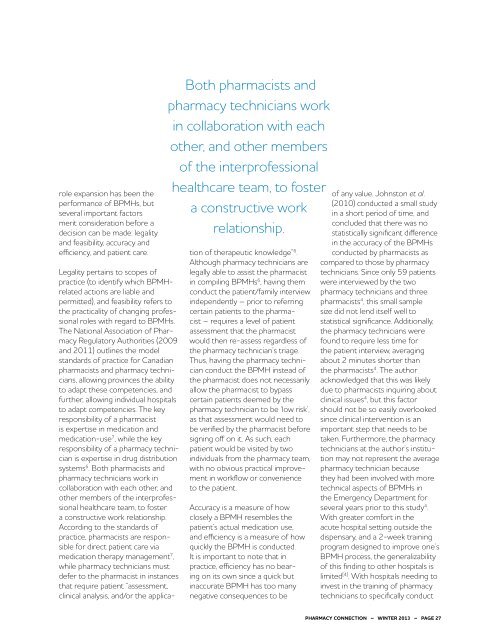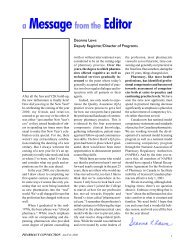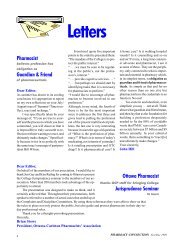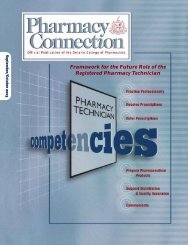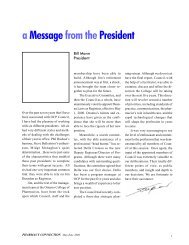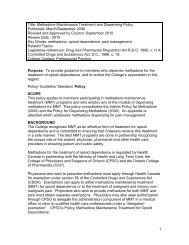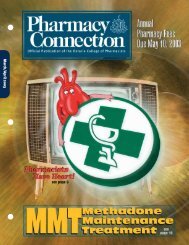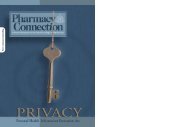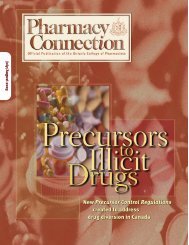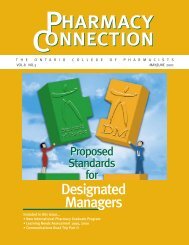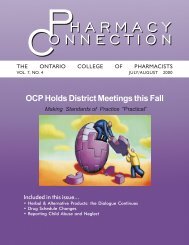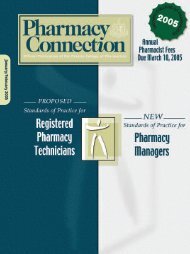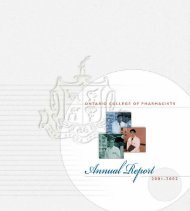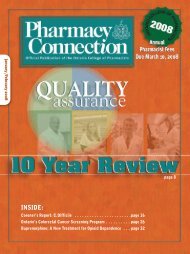Download - Ontario College of Pharmacists
Download - Ontario College of Pharmacists
Download - Ontario College of Pharmacists
Create successful ePaper yourself
Turn your PDF publications into a flip-book with our unique Google optimized e-Paper software.
ole expansion has been the<br />
performance <strong>of</strong> BPMHs, but<br />
several important factors<br />
merit consideration before a<br />
decision can be made: legality<br />
and feasibility, accuracy and<br />
efficiency, and patient care.<br />
Both pharmacists and<br />
pharmacy technicians work<br />
in collaboration with each<br />
other, and other members<br />
<strong>of</strong> the interpr<strong>of</strong>essional<br />
healthcare team, to foster<br />
a constructive work<br />
relationship.<br />
Legality pertains to scopes <strong>of</strong><br />
practice (to identify which BPMHrelated<br />
actions are liable and<br />
permitted), and feasibility refers to<br />
the practicality <strong>of</strong> changing pr<strong>of</strong>essional<br />
roles with regard to BPMHs.<br />
The National Association <strong>of</strong> Pharmacy<br />
Regulatory Authorities (2009<br />
and 2011) outlines the model<br />
standards <strong>of</strong> practice for Canadian<br />
pharmacists and pharmacy technicians,<br />
allowing provinces the ability<br />
to adapt these competencies, and<br />
further, allowing individual hospitals<br />
to adapt competencies. The key<br />
responsibility <strong>of</strong> a pharmacist<br />
is expertise in medication and<br />
medication-use 7 , while the key<br />
responsibility <strong>of</strong> a pharmacy technician<br />
is expertise in drug distribution<br />
systems 6 . Both pharmacists and<br />
pharmacy technicians work in<br />
collaboration with each other, and<br />
other members <strong>of</strong> the interpr<strong>of</strong>essional<br />
healthcare team, to foster<br />
a constructive work relationship.<br />
According to the standards <strong>of</strong><br />
practice, pharmacists are responsible<br />
for direct patient care via<br />
medication therapy management 7 ,<br />
while pharmacy technicians must<br />
defer to the pharmacist in instances<br />
that require patient “assessment,<br />
clinical analysis, and/or the application<br />
<strong>of</strong> therapeutic knowledge” 6 .<br />
Although pharmacy technicians are<br />
legally able to assist the pharmacist<br />
in compiling BPMHs 6 , having them<br />
conduct the patient/family interview<br />
independently – prior to referring<br />
certain patients to the pharmacist<br />
– requires a level <strong>of</strong> patient<br />
assessment that the pharmacist<br />
would then re-assess regardless <strong>of</strong><br />
the pharmacy technician’s triage.<br />
Thus, having the pharmacy technician<br />
conduct the BPMH instead <strong>of</strong><br />
the pharmacist does not necessarily<br />
allow the pharmacist to bypass<br />
certain patients deemed by the<br />
pharmacy technician to be ‘low risk’,<br />
as that assessment would need to<br />
be verified by the pharmacist before<br />
signing <strong>of</strong>f on it. As such, each<br />
patient would be visited by two<br />
individuals from the pharmacy team,<br />
with no obvious practical improvement<br />
in workflow or convenience<br />
to the patient.<br />
Accuracy is a measure <strong>of</strong> how<br />
closely a BPMH resembles the<br />
patient’s actual medication use,<br />
and efficiency is a measure <strong>of</strong> how<br />
quickly the BPMH is conducted.<br />
It is important to note that in<br />
practice, efficiency has no bearing<br />
on its own since a quick but<br />
inaccurate BPMH has too many<br />
negative consequences to be<br />
<strong>of</strong> any value. Johnston et al.<br />
(2010) conducted a small study<br />
in a short period <strong>of</strong> time, and<br />
concluded that there was no<br />
statistically significant difference<br />
in the accuracy <strong>of</strong> the BPMHs<br />
conducted by pharmacists as<br />
compared to those by pharmacy<br />
technicians. Since only 59 patients<br />
were interviewed by the two<br />
pharmacy technicians and three<br />
pharmacists 4 , this small sample<br />
size did not lend itself well to<br />
statistical significance. Additionally,<br />
the pharmacy technicians were<br />
found to require less time for<br />
the patient interview, averaging<br />
about 2 minutes shorter than<br />
the pharmacists 4 . The author<br />
acknowledged that this was likely<br />
due to pharmacists inquiring about<br />
clinical issues 4 , but this factor<br />
should not be so easily overlooked<br />
since clinical intervention is an<br />
important step that needs to be<br />
taken. Furthermore, the pharmacy<br />
technicians at the author’s institution<br />
may not represent the average<br />
pharmacy technician because<br />
they had been involved with more<br />
technical aspects <strong>of</strong> BPMHs in<br />
the Emergency Department for<br />
several years prior to this study 4 .<br />
With greater comfort in the<br />
acute hospital setting outside the<br />
dispensary, and a 2-week training<br />
program designed to improve one’s<br />
BPMH process, the generalizability<br />
<strong>of</strong> this finding to other hospitals is<br />
limited [4] . With hospitals needing to<br />
invest in the training <strong>of</strong> pharmacy<br />
technicians to specifically conduct<br />
PHARMACY CONNECTION ~ WINTER 2013 ~ PAGE 27


